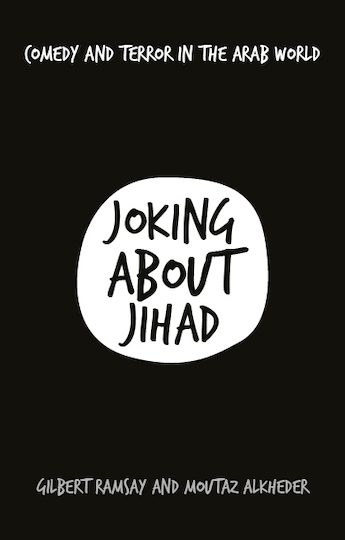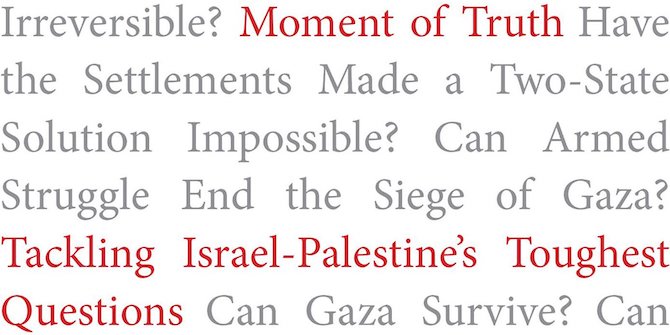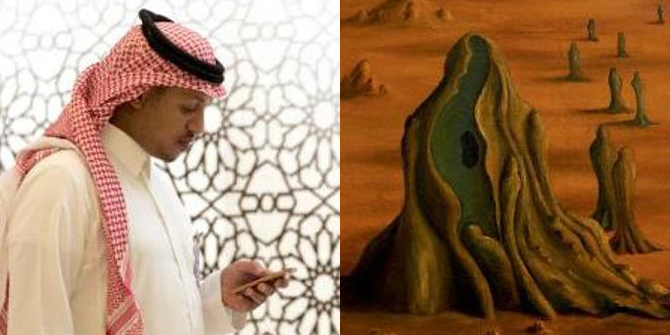by Haian Dukhan
Joking About Jihad, as the authors suggest on the first page, does not refer to making fun of the concept in the general Islamic sense. Rather, it deals with jokes about jihadi groups and the ideologies they represent. In this book the authors aim to examine the emergence of ‘jokes about jihad’ in Arabic-language comedy and situate this within the broader theoretical context of humour. They are concerned with how comedies and informal jokes can be used to uncover the underlying fears and tensions experienced by the people living through these situations. The book is divided into eight chapters that explore two main questions: a) Which ways of joking about jihadis are effective? and b) How are the subjects of jihadism and Islamism treated humorously in the Arab world, including by jihadists and Islamists themselves?
The book is an interdisciplinary study whose authors delved into the literature of Arabic popular cultural studies, Islamic studies and humour studies. The authors include interviews with comedians, policymakers, Arab cultural critics and eyewitnesses to jihadi activities. Over an extended period, they also compiled a large collection of visual and textual material satirising jihadis from platforms such as Facebook, and other blogs and forums. They also searched for examples of Arabic-language films and TV series that address themes relevant to the subject. In order to gain insights into Arab audiences and their perception of this brand of humour, the authors created online surveys which gathered over six hundred responses.
The authors examine how humour is used as a counternarrative by global counterextremism practitioners (p. 13). For these practitioners, the appeal of terrorist groups can be undermined through laughter and mockery. The authors note that there are merits and demerits of using this approach – on one hand, it avoids glorifying terrorists and encourages the public to take them less seriously, but on the other, it risks creating humiliation and offence, stirring up anger and violent reactions from other non-jihadi groups. The authors attempt to add theoretical depth to the scholarly literature on humour and its connection to persuasion, political change and political violence. By tracing the historical roots of humour, Ramsay and Alkheder recognise four ideal mechanisms that are relevant to the intersection of humour and conflict: pillory, travesty, raillery and coxcombry (p. 57).
The authors share important insights by examining the first Arabic-language comedies that publicly criticised Islamists. They use the important Egyptian film The Terrorist and the Saudi TV series Tash Ma Tash as case studies and argue that both works pioneered portraying Islamists in a comic way (p. 87). The makers achieved this through upholding essentially conventional and conservative visions of society, which did not advocate for progress against the status quo.
Chapter 5, ‘Terrorism at the Gates’, gets to grips with the subject matter by examining the rapid increase in comedy aimed at jihadis that emerged after the rise of the Islamic State in Iraq and Syria (ISIS). Material satirising the group became widespread, much of it utilising the word most Arabs used for the organisation: Daesh. This chapter makes for chilling reading as it deals with the horrors of ISIS and then shows the main types of Arabic comedy that have lampooned the group, providing several detailed case studies of comedies such as the Iraqi TV series Dawlat al-Khurafa and the Syrian show Dayaaltaseh. In a similar vein to the period preceding the Arab Spring, comedians have been walking a thin line, trying to stay away from accusations that they are making fun of Islam itself. This work also has often had to be done under authoritarian or sectarian conditions with their associated other sensitive issues.
In Chapter 6, the authors explore in detail the complex place of laughter within the utopianism of the jihadi movement (p. 141). They show how jihadis make use of jokes, which they call tara’if, to increase the attractiveness of their way of life and to ridicule their enemies. They unveil the unclear position of this humour in the official propaganda of jihadi groups and argue that it plays a role in their recruitment process. The tara’if recounted in web forums play a role in making ‘joining the jihad’ appear enticing for bored youths looking for adventure. The authors attempt to explore the attitudes regarding the acceptability of joking about jihadi groups by examining the most original work done on humour via the web after the Arab Spring (p. 174). In Chapter 7, they also examine the modern-day memes and jokes shared online and identify key themes related to anti-ISIS humour.
One of the most fascinating findings is that humour serves to reinforce the polarisation in the Arab world between liberal and conservative, secularist and Islamist, Sunni and Shia. Despite this grim picture, there are some rays of hope. Firstly, some Arab comedians have started to use more inclusive language to unite people with different viewpoints and these are paving the way for a less polarised civil society. Secondly, the emergence of humour in formerly Islamist spaces has helped create new critiques of religious extremism. Thirdly, even though humour on its own will not defeat religious extremism, Arab comedy is playing a role in encouraging conversation about topics that once were considered taboo.
Nearly twenty years since the onset of the ‘War on Terror’, the ‘War of Ideas’ – considered an important dimension of the battle – seems to have accepted the role of comedy as a potentially promising method for combatting extremist groups such as al-Qaeda and ISIS. Since then, most of the debates revolving around the role of humour in counterextremism have remained in the realms of government, strategic analysis and specialist think-tanks. Joking about Jihad may be the first academic book that contributes to this discussion on the role of humour in counterextremism.








1 Comments